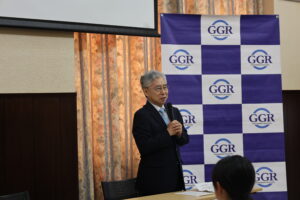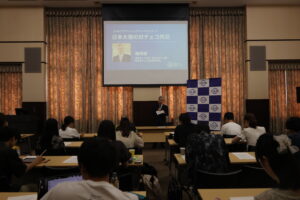On September 30, 2025, the Institute for Global Governance Research (GGR) at Hitotsubashi University held the 43rd Brown Bag Lunch Seminar titled “Japanese Ambassador’s Diplomacy toward the Czech Republic.” The speaker was Ambassador Kaoru Shimazaki, former Ambassador of Japan to the Czech Republic and Jordan, and current Chairperson of the Japan Czech Friendship Association.
Ambassador Shimazaki began his lecture by introducing the basic facts and historical background of the Czech Republic. Situated in the heart of Europe, the Czech Republic is known not only for its rich culture and artistic traditions but also for its advanced science, technology, and manufacturing industries, making it one of the leading industrial nations in Central and Eastern Europe. He noted that the country has maintained steady economic growth and one of the lowest unemployment rates in the EU. Historically, the Czech lands have been a geopolitical focal point where European powers have contended for influence. Citing examples such as the Defenestration of Prague (1618) which triggered the Thirty Years’ War, or the Battle of Austerlitz (1805) and the Munich Agreement (1938), he referred to the saying, “Whoever controls Bohemia controls Europe.”
The Ambassador then discussed the Czech Republic’s foreign policy and its relations with Japan. According to him, the Czech Republic’s diplomacy is grounded in the fundamental values of liberal democracy. Drawing on its experience during the communist era, particularly the “Prague Spring,” the Czech Republic maintains a strong belief in freedom and democracy. At the same time, he pointed out that anti-Russian sentiment has become pronounced in recent years. Although relations with China were strengthened a few years ago, they have cooled rapidly. He noted that while the Czech Republic has traditionally prioritized coordination with the EU and NATO, following the parliamentary elections in October, it may seek not only to maintain its ties with the West but also to pragmatically recalibrate its relations with China, Russia, Hungary, and Slovakia. He further emphasized that Japan and the Czech Republic have built a strong relationship since the latter’s independence, with growing expectations for further increased Japanese investment, expansion of Czech exports to Japan, promotion of mutual dignitary visits and deeper cultural, artistic, and academic exchanges.
The lecture was followed by a lively Q&A session, during which participants asked questions on a wide range of topics, including the strengthening of bilateral relations, human rights diplomacy, defense cooperation, cultural differences, and the Czech Republic’s stance toward Russia. Ambassador Shimazaki highlighted the similarities between Japanese and Czech diplomacy in their shared approach to values such as human rights and democracy, viewing them from a multifaceted perspective. Concluding his talk, he underscored the importance of the Czech Republic as a reliable partner with which Japan can engage in frank and open dialogue on shared values.
【Event report prepared by】
Nakajima Takahiro (Master’s student, Graduate School of Law, Hitotsubashi University)
 |
 |
